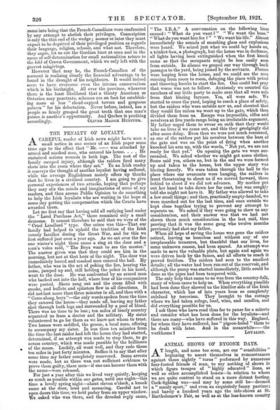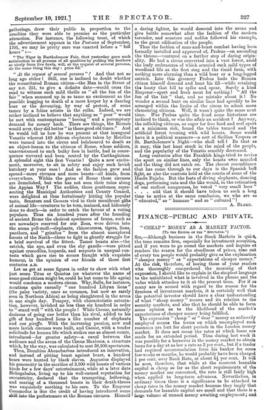ANIMAL SHOWS OF BYGONE DAYS.
ATlength, and none too soon, are our " sensibilities " beginning to assert themselves in remonstrances against those nightly " turns " performed by numerous four-footed friends of man, to say nothing of shows in which figure troupes of " highly educated " lions, as well as other accomplished beasts—in relation to whom we are quite content to stand on a more distant footing. Cock-fighting was—and may by some still be—deemed a " manly sport," and even an exquisitely funny pastime; and barely a hundred years ago the aide-shows at St. Bartholomew's Fair, as well as at the less-known country gatherings, drew their public in proportion to the cruelties they were able to promise as the particular attraction. For instance, the following treat, of which the advertisement appears in the Postman of September, 1701, we may be pretty sure was enacted before a " full house " :- " The Tiger in Bartholomew Fair, that yesterday gave such satisfaction to all persons of all qualities by pulling the feathers so nicely from live fowls, will, at the request of several persons, do the same thing this day : price 6d."
" At the request of several persons" I And that not so long ago either I Still, one is inclined to doubt whether the resuscitated Roman citizen—the Man in the Street of say B.O. 251, to give a definite date—would cross the road to witness such mild thrills as " all the fun of the fair " when summed up in so tame an excitement as the possible hugging to death of a mere keeper by a dancing bear or the devouring, by way of protest, of some tamer by a feline artiste in the sulks. Indeed, we are rather inclined to believe that anything so " poor " would be met with contemptuous " booing " and a peremptory demand for money back. There are things, the Roman would aver, they did better " in those good old times." And he would tell us how he was present at that inaugural Venatio whereat 140 African elephants taken by Metellus were turned into the circus and belaboured to death as an object-lesson to the citizens of Rome, whose soldiers, unaccustomed to such bulky foes in battle, had in conse- quence wavered and been routed by the Carthaginians. A sp1pnr1 id sight this first Venatio I Quite a new excite- ment, moreover, to sit in safety and enjoy such lavish butchery at your ease 1 And so the fashion grew and spread torecircuses and more beasts—all kinds, from everywhere. Within the gates of Rome these circuses are demolished, but who has not seen their ruins along the Appian Way The aediles, those gentlemen repre- senting the Municipal Authorities and County Council, were delighted at thus fortuitously hitting the popular taste. Senators and Caesars vied in their munificent gifts of animal life—creatures to be torn, maimed, and hideously done to death—in order to catch the favour of a voting populace. Thus six hundred years after the founding of ancient Rome the choicest specimens of fauna, such as are nowadays reserved for our Zoos, were driven into the arena pell-mell--elephants, rhinoceroses, tigers, lions, panthers, and " grizzlies " from the almost unexplored forests of the North—there to fight in ghastly struggle for a brief survival of the fittest. Tamer beasts also—the ostrich, the ape, and even the shy gazelle—were pitted against crocodiles, leopards, and serpents in unequal con- tests which gave rise to scenes fraught with exquisite humour, in the opinion of our friends of those first centuries A.D.
Let us get at some figures in order to show with what just scorn Titus or Quintus (or whatever the name of some good citizen might be, could he but come to life again) would condemn a modern circus. Why, Sulla, for instance, mentions quite casually " one hundred Libyan lions " (the paler variety, once so common, but now so rarely seen in Northern Africa) as being slaughtered in the arena in one single day. Pompey, with characteristic ostenta- tion, however, lavished no less than six hundred in order to " stand well " with the people I While Caesar, naturally desirous of going one better than his rival, added to his gift of four hundred lions a like number of elephants and one giraffe. With the increasing passion, new and more lavish circuses were built, and Caesar, with a tender solicitude for human life which strikes one as almost comic, introduced—for greater safety—a canal between the audience and the arena of the Circus Maximus, a structure which, by the way, was calculated to seat 38,500 spectators. Then, Domititia Ahenobarbus introduced an innovation, and instead of pitting beast against beast, a hundred bears were hunted by black slaves. Augustus displayed his generosity in the sacrifice of 3,500 wild beasts of various kinds for a few days' entertainment, while at a later date Heliogabalus, living up to his well-earned reputation for eccentricity, declared that the trumpeting, bellowing, and roaring of a thousand beasts in their death-throes was exquisitely soothing to his ears. To the Emperor Commodus is due the credit of having introduced some eldll into the performance at the Roman circuses. Himself a daring fighter, he would descend into the arena and give battle somewhat after the fashion of the modern toreador, and senators and nobles followed his example, to the great edification of the people. Thus the fashion of man-and-beast combat having been formally installed and approved of, Probus—on ascending the throne—ventured on a further step of daring origin- ality. Ho had a circus converted into a vast forest, amid the leafy embrasures of which scurried such mild types of woodland life as the fleet stag and the timid faun, with nothing more alarming than a wild boar or a long-legged ostrich. Into this greenery Probus bade the Roman citizen himself descend and hunt his fill—while retaining the booty that fell to spike and spear. Surely a kind Emperor—sport and fresh meat for nothing I All the fun of the fair " that, and no mistake about it I No wonder a second hunt on similar lines had speedily to be arranged within the limits of the circus to admit more clamouring citizens. Well, it wasn't quite the same next time. Was Probus quite the fiend some historians are inclined to think, or was the affair an accident ? Anyway, the rollicking citizens, so eager for free food and real sport at a minimum risk, found the tables turned and the artificial forest teeming with wild beasts. Some would have it a political massacre—a sort of Sicilian Vespers or St. Bartholomew's Night—who shall tell ? Bo that as it may, this last hunt stuck in the mind of the people, and the popularity of the Venatio sensibly decreased. Long centuries after the Frankish kings tried to revive the sport on similar lines, only the beasts were muzzled and the thing did not catch on. The closest resemblance that has come through to our days is the Spanish bull fight, as also the contests held at the courts of some of the Hindu Rajahs. But the feats of diving elephants, dancing dogs, performing cats and the like would, in the estimation of our earliest conquerors, be voted " very small beer " . . . odd that it should have taken us such a long time to arrive at the same conclusion, we who are so " educated," so " humane " and so " cultured " I A. BLAKE.



































 Previous page
Previous page